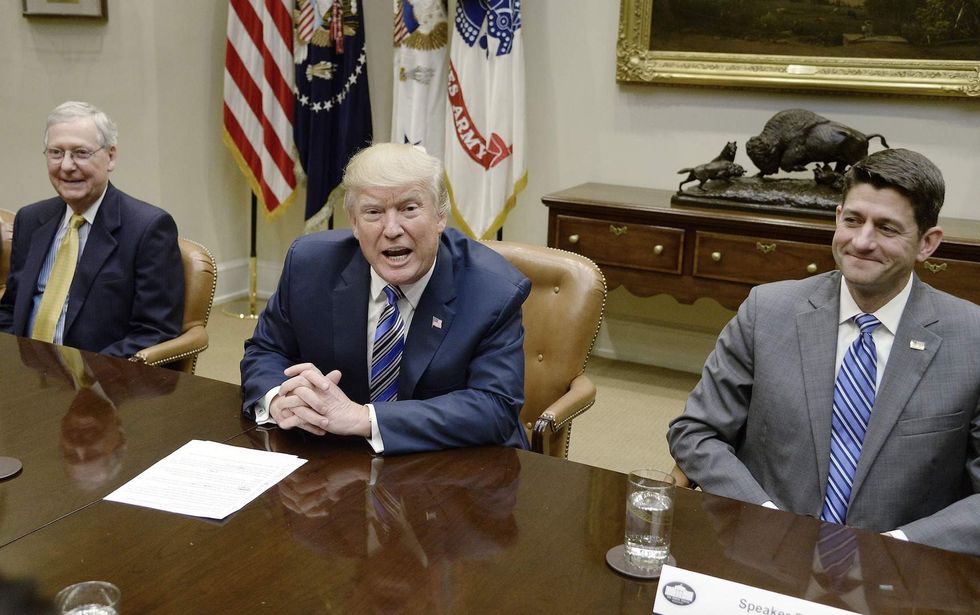
Congress will be faced with a host of crucial and time-sensitive legislative challenges upon return from August recess. (Olivier Douliery-Pool/Getty Images)

We're more than seven months into President Donald Trump's first term, and with some crucial legislative deadlines ahead, it's time for Congress to get something done, and fast.
This year has, so far, seen plenty of drama and infighting among the president and congressional leaders. Even though Trump has signed 53 bills into law, his administration has not seen any significant legislative accomplishments, despite Republican control of the White House, the House of Representatives and the Senate.
That must change quickly, or there will be painful consequences felt by everyone from the president down to everyday, hard-working citizens. Here are the immediate issues Congress must make progress on as members return to work Tuesday after the August recess:
When members of Congress went their separate ways for their annual summer recess, none of them expected they'd be returning to deal with a natural disaster of possibly unprecedented scope. Now, much of south Texas is still underwater, and the impacted cities need billions of dollars for recovery.
You'd think this would be an uncontroversial measure that would pass without issue, but think again. Treasury Secretary Steve Mnuchin said both he and the president want to pair the Harvey relief fund bill to the upcoming vote to raise the debt ceiling (more on that later). That plan has gained support among both Republicans and Democrats, but fiscally conservative Republicans aren't having it.
Fiscally conservative Republicans have long wanted the debt ceiling vote to be tied to spending cuts, so the idea of using a widely popular measure (Harvey funds) as leverage to raise the debt ceiling is alarming to those in Congress who look at the rate of national debt increase with concern.
A house bill for Harvey relief currently does not contain language tying it to the debt ceiling, but that could change once it gets to the Senate.
The government is going to reach its borrowing limit at the end of September. According to Mnuchin, the debt ceiling must be raised by September 29, or our nation's financial health could suffer dramatically. Federal default mean the stock markets go down and interest rates go up. Bad news for the economy, to say the least.
It's useful to keep in mind that there has never been a default, and also to note that the debt ceiling is somewhat of an artificial limit. In fact, we technically exceeded the limit months ago. However, the potential impact on the markets is still real, as is the potential for the U.S. credit rating to be affected.
The legislature has to pass a bill to fund the federal government in order to avoid a partial shutdown that would go into effect October 1. If they fail to do so, federal workers could get sent home without pay, federal service could be limited, and national parks would close.
Democrats have enough votes to block a bill they don't like, which could become problematic if the bill introduces any new spending for conservative initiatives such as the border wall, or if there are any proposed cuts to Planned Parenthood funding.
Republican attempts to repeal and replace Obamacare were unsuccessful, which raises the stakes for tax reform, something President Trump has made clear is a priority. Trump has put pressure on Congress, particularly Senate Majority Leader Mitch McConnell, to pass tax reform.
In an op-ed published Sunday in the Milwaukee Journal Sentinel, Trump detailed his desire for a simplified tax code, and a system that keeps more money in the pockets of American workers and families.
Tax reform is the top Republican legislative priority right now, and it will be a revealing test of the ability of the president and Congress to work together for the benefit of the conservative agenda.
This one might be a little bit down the road, but there isn't that much time. With Trump expected to officially announce the end of the Deferred Action for Childhood Arrivals program Tuesday, he is effectively placing the ball in Congress' court to decide the fate of the "Dreamers," undocumented immigrants who were brought to the United States as children.
The ending of DACA, which was implemented through a Barack Obama executive order, doesn't necessarily signal a desire by Republicans that the approximately 800,000 program participants be deported, although some certainly hold that view.
Some conservatives are in favor of amnesty for Dreamers, but believe any sort of amnesty program for childhood arrivals should be passed through Congress. However, with such a full plate upon their return, there are questions about whether six months will be enough time for Congress to fully address this divisive issue.